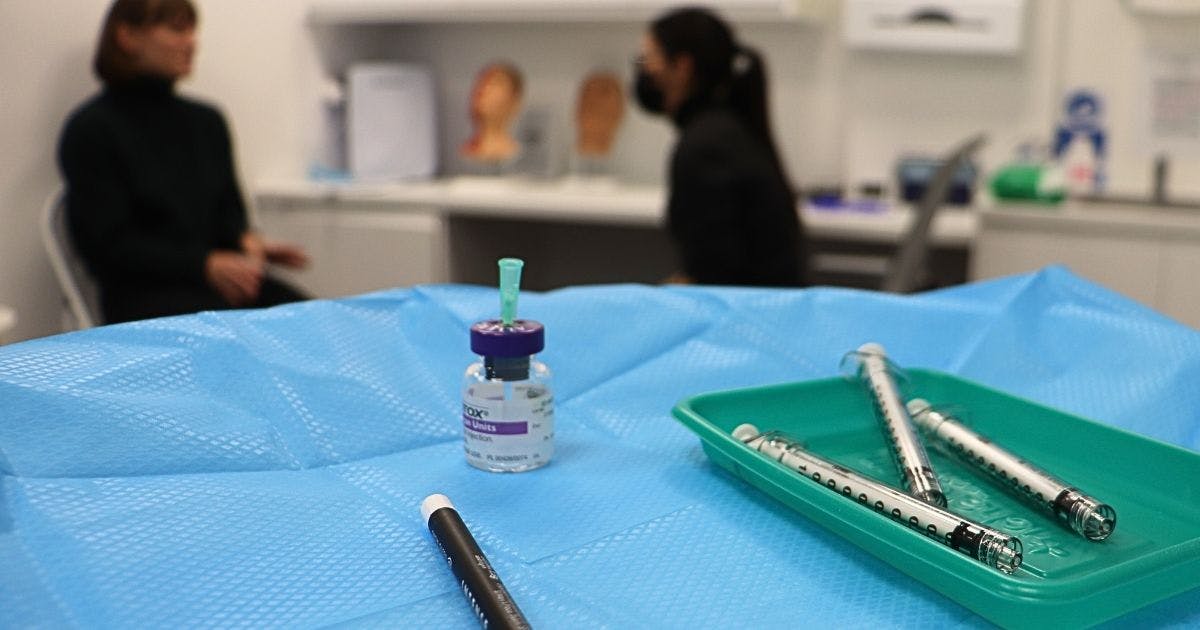Remote Prescribing is Not Permitted in Aesthetic Medicine

On 23 February 2024, the Healthxchange group circulated a reminder as to why remote prescribing is not permitted in aesthetic medicine.
The communication was sent by Richard Ghanty BPharm MRPharmS, Director for UK Pharmacy Services and Chair of UK Pharmaceutical Regulatory Committee - Healthxchange Group. This business is one of the largest and most reputable aesthetic medicine pharmacy companies in the UK.
His warnings follow growing concerns surrounding aesthetics practitioners not following the rules for toxin and filler consultations. As such, we wanted to remind you of the importance of face-to-face consultations...

Remote prescribing for cosmetic injectables is not permitted
Remote prescribing - where you prescribe prescription-only medications (POMs) for patients you do not see in person - is not permitted for cosmetic injectables in England.
Phone or video consultations for prescribing are banned for General Medical Council (GMC) members, as are any other method of consulting whereby you are not physically present with the patient.
Updated - 2 September 2024: The Nursing and Midwifery Council (NMC) released a statement on 30 August 2024 advising that it is reviewing its policy on remote prescribing in aesthetics. Unlike GMC members, it is not mandatory for aesthetic nurse prescribers to hold face-to-face consultations with patients, though it's encouraged. This is something the NMC is considering a ban on, to bring their policies in line with those of the GMC, according to the Nursing Times.
Updated - 29 April 2025: Today the NMC announced that remote prescribing will no longer be permitted for aesthetic nurses. All prescribing must be done face-to-face, bringing cosmetic nurses in line with all other healthcare professionals practising aesthetic medicine.
A press release posted to the NMC website, explained: 'The NMC is updating its position on the remote prescribing of non-surgical cosmetic medicines, including certain anti-wrinkle injections and aesthetic emergency kit items.
'From 1 June 2025, nursing and midwifery prescribers will be required to consult with people face-to-face before issuing prescriptions for these procedures.
'We expect all nurse and midwife prescribers to deliver safe and effective prescribing practice every day, but inconsistent regulation of non-surgical cosmetic practice can present risks to people who use these services and the public. Face-to-face consultations support the mitigation of these risks, and adopting this position will better align the NMC with other health and care regulators.'
The organisation detailed the reasoning behind this decision as being based on research findings. 'We carried out research and stakeholder engagement to understand people’s perceptions of remote prescribing, and the impact any potential changes would have on those administering and receiving non-surgical cosmetic medicines.
'In 2024 we commissioned independent public-facing research by the agency Thinks, who engaged with members of the public who had undergone non-surgical cosmetic procedures and those who had not. Meanwhile, the NMC hosted a roundtable event which was attended by:
- Regulated health and care professionals who prescribe non-surgical cosmetic medicines
- Non-prescribing, regulated health and care professionals who administer non-surgical cosmetic treatments
- Unregulated practitioners who administer non-surgical cosmetics treatments such as beauticians
- Cosmetic business owners.'
It further states that this research uncovered the following:
- 'Overall, people supported the NMC strengthening its position to better protect the public, and agreed that it would improve safety for people using services
- Many people who underwent non-surgical cosmetic procedures had not fully considered how the medicine was obtained when the person administering or injecting it was not a healthcare professional, nor did they realise that these were prescribed medicines
- Some participants, especially business owners, thought that video consultations should be permitted and that a requirement for face-to-face consultations felt outdated
- Many people perceived procedures to be overly accessible, taking place within unregulated environments and unsure whether those administering or injecting medicines had sufficient training.'
You are obliged to perform face-to-face consultations
Richard Ghanty states, "There is an obligation to perform a Face-to-face consultation prior to prescribing Botulinum Toxins or Dermal Fillers for any patient seeking a cosmetic treatment.
"Remote prescribing, for cosmetic patients, is therefore not permitted for any third party without you having first performed a Face-to-Face consultation with that patient."
It is worth noting that face-to-face consultations are necessary every time a patient presents for a treatment that requires a prescription. For example, botox review appointments as well as scheduled toxin appointments.
Approach endorsed by the JCCP and CPSA
We previously covered the topic of remote prescribing and the need for face-to-face consultations in June 2022. This was when the Joint Council for Cosmetic Practitioners (JCCP) released its own guidance on the issue.
In a press release, the JCCP explained, "“In line with several Professional Statutory Regulators (the General Medical Council and the General Dental Council and in accordance with guidance set down by the Royal Pharmaceutical Society) the JCCP and the CPSA (The Cosmetic Practice Standards Authority) have set down their decision not to endorse or permit the remote prescribing of any prescription medicine when used for specifically for non-surgical cosmetic treatments.”
The importance of face-to-face prescribing was also included in the JCCP's 10 Point Plan. This initiative provided thought leadership on how non-surgical cosmetic procedures are regulated. It came at a time when the government is considering how best to introduce regulation in England.

Responsible prescribing within aesthetic medicine
As an aesthetics practitioner, ensuring you have a thorough, considered and ethical consultation with each patient is crucial. It can inform your patient selection and treatment plans, to help you deliver the best possible results.
Whether you're prescribing yourself, or working with one, there are rules to follow to ensure safety and propriety.
Ghanty advises that, "Prescribing must be appropriate for any named patient in terms of quantity and frequency in keeping with the clinic needs."
He gives the example of it being inappropriate "to use the same named patient repeatedly over a short period of time simply to acquire stock for clinic use..."
Taking delivery of aesthetics products and medicines
Updated 20 March 2024: In a separate Healthxchange email communication dated 19 March 2024, Richard Ghanty provides an important update regarding the ethical process for taking dellivery of stock.
"To ensure the stock supply of medicines from Healthxchange remain safely under the care of healthcare professionals, who are lawfully registered to prescribe, I am writing to advise you on how we fulfil our duty in the supply chain.
"We are only able to supply to a Clinic or Business premises where the registered prescriber has full control over those medicines and is responsible for the safe storage in keeping with the principles of good medicines management.
"Clinics and Businesses which are registered with the CQC, HIS or RQIA are regulated and naturally fulfil this requirement as part of their registration.
"We do, however, recognise that the CQC or the other bodies may not require registration of a clinic which only offers non-surgical treatments. Under these circumstances, should these premises be operating as a Clinic and the medicines are under the control of the prescriber, we will be able to deliver if the address indicates it operates as a Clinic and the prescriber has that degree of control.
"Similarly, should you be using your home address as a Clinic then you will be required to indicate this on the delivery address.
"Unfortunately, in the case of medicines, it is not acceptable to ask for a delivery to be left with your neighbour or in a garage."

Holding stock as an aesthetics practitioner
Aesthetics practitioners often ask us who can hold stock - meaning keeping stores of prescription medication not allocated to a named patient. The answer is fairly straightforward for injectors in England...
Holding botulinum toxin stock in England:
Only doctors and dentists can hold stock in their clinics. They can then prescribe toxin for each patient and 'dispense' from this stock on the day of treatment.
Holding dermal filler stock in England:
Anyone can hold stock of dermal fillers as these are not prescription-only medications.
Holding stock of Hyaluronidase in England:
As this is a prescription drug, the same rules apply as for toxin. Remote prescribing of hyaluronidase is also not permitted.
If you're an aesthetic nurse or clinical pharmacist but are not a prescriber, you may work with a prescriber to gain access to POMs such as botulinum toxin. This can be a suitably qualified individual or an agency. You can find out more about this in our article on Finding and Working with a Prescriber in Aesthetics.
Even when working with individuals or agencies, you are required to ensure face-to-face consultations take place.
Due to the extra time, admin and costs associated with working with a prescriber, many aesthetic nurse practitioners and clinical pharmacists decide to train as a prescriber.
Becoming an aesthetic nurse prescriber is something our clinical trainer Shantel Noble, RGN, has previously spoken about.
Harley Academy Level 7 graduates' V300 course option
Graduates of the Harley Academy Level 7 Diploma in Botox & Dermal Fillers course are eligible to join the V300 prescribing course at the University of the West of England. Obviously, this is assuming all other course criteria is met.
This is due to our long-standing relationship. It is also in recognition of the high standard of our postgraduate level injectables training which is Ofqual-regulated. Additionally, both our Level 7 Diploma injectables course and Harley Academy are JCCP-approved.
The V300 prescribing course is available at several universities across the UK. Many of these require applicants to hold a Level 7 in injectables as part of their entry criteria. This should be useful information for anyone considering whether to do a Level 7 or V300 course first.
Maintaining patient safety and trust
Being able to prescribe offers you more freedom in your clinical practice. However, as Richard Ghanty reminds us, this should always be done ethically. He notes, "Rational and ethical prescribing will enable you to maintain the integrity of your practice by upholding strict adherence to the guidelines for usage and administration of medication to patients.
"This is important in maintaining patient safety and trust in relation to patient care."
All information correct at the time of publication
Download our full prospectus
Browse all our injectables, dermal fillers and cosmetic dermatology courses in one document
By submitting this form, you agree to receive marketing about our products, events, promotions and exclusive content. Consent is not a condition of purchase, and no purchase is necessary. Message frequency varies. View our Privacy Policy and Terms & Conditions
Attend our FREE open evening
If you're not sure which course is right for you, let us help
Join us online or in-person at our free open evening to learn more
Our Partners













STAY INFORMED
Sign up to receive industry news, careers advice, special offers and information on Harley Academy courses and services

